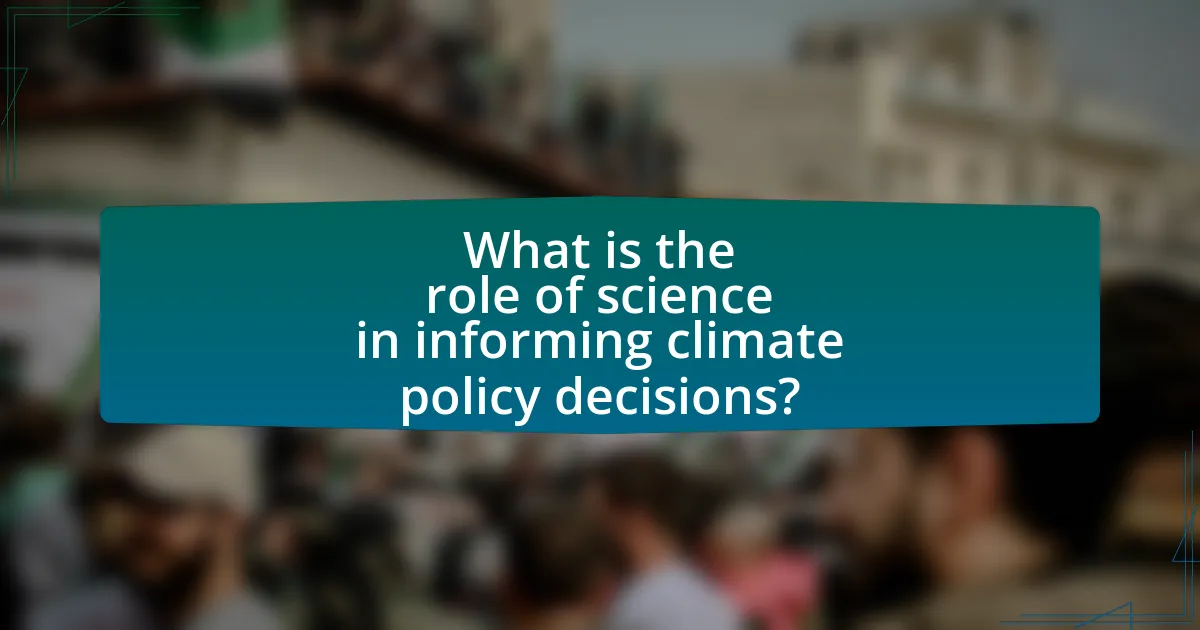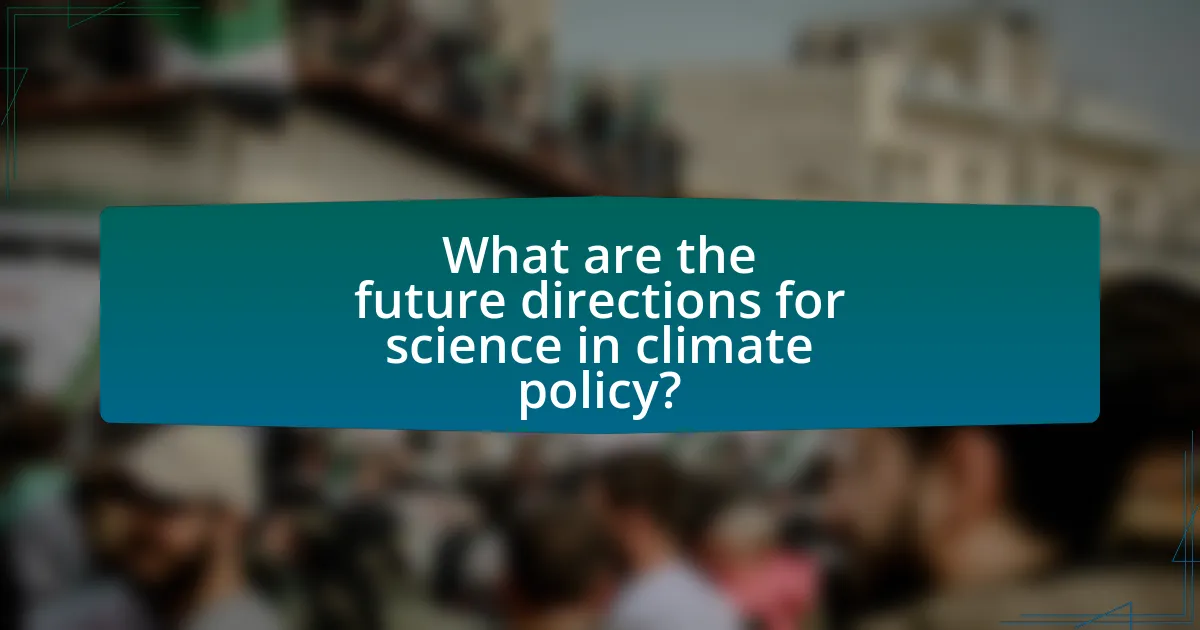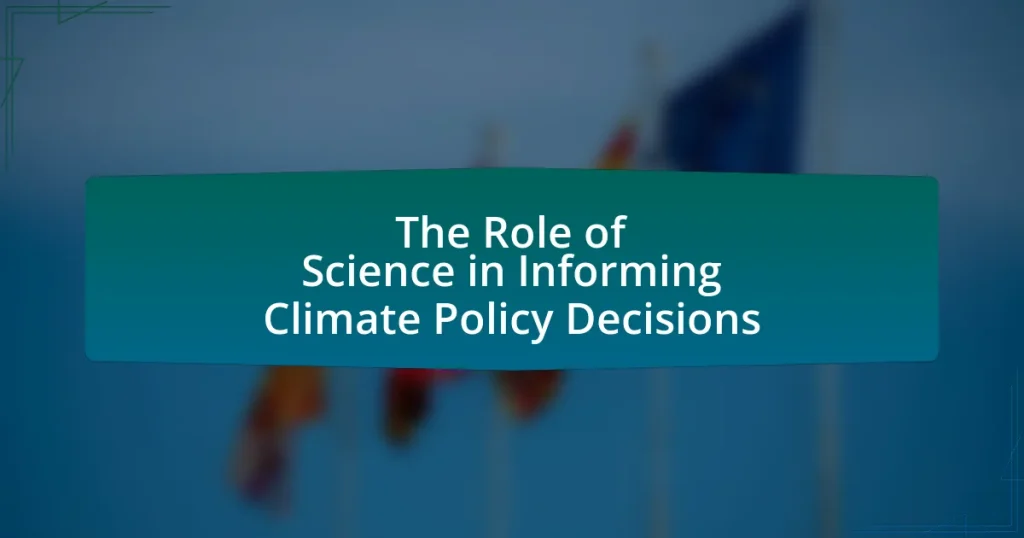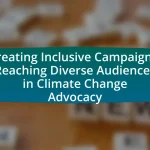The article focuses on the critical role of science in informing climate policy decisions. It outlines how scientific research, particularly reports from the Intergovernmental Panel on Climate Change (IPCC), provides essential data and analysis that guide policymakers in understanding climate change impacts and developing effective mitigation strategies. Key topics include the influence of scientific research on policy formulation, the types of relevant scientific data, the communication methods used by scientists to engage with policymakers, and the consequences of ignoring scientific advice. Additionally, the article discusses the challenges scientists face in influencing climate policy, the importance of public perception, and future directions for integrating science into climate policy.

What is the role of science in informing climate policy decisions?
Science plays a critical role in informing climate policy decisions by providing evidence-based data and analysis that guide policymakers in understanding climate change impacts and mitigation strategies. Scientific research, such as the Intergovernmental Panel on Climate Change (IPCC) reports, offers comprehensive assessments of climate science, including temperature trends, greenhouse gas emissions, and potential future scenarios. This data enables policymakers to make informed decisions that address climate risks, set emission reduction targets, and develop adaptation strategies. For instance, the IPCC’s Sixth Assessment Report highlights the urgent need for global action to limit warming to 1.5 degrees Celsius, underscoring the importance of scientific findings in shaping effective climate policies.
How does scientific research influence climate policy formulation?
Scientific research significantly influences climate policy formulation by providing evidence-based data that informs decision-making processes. For instance, the Intergovernmental Panel on Climate Change (IPCC) reports synthesize extensive scientific findings on climate change impacts, risks, and mitigation strategies, which policymakers utilize to develop regulations and initiatives. Additionally, research studies, such as those published in journals like Nature Climate Change, offer insights into the effectiveness of various climate interventions, guiding governments in prioritizing actions that yield the most substantial environmental benefits. This reliance on scientific evidence ensures that climate policies are grounded in factual understanding, enhancing their effectiveness and public acceptance.
What types of scientific data are most relevant to climate policy?
The types of scientific data most relevant to climate policy include temperature records, greenhouse gas emissions data, climate models, and impacts on ecosystems. Temperature records provide historical context and trends, showing how global temperatures have changed over time, which is crucial for understanding climate change. Greenhouse gas emissions data quantifies the sources and levels of emissions, informing policymakers about the primary contributors to climate change. Climate models simulate future climate scenarios based on various emission pathways, helping to predict potential impacts and guide policy decisions. Lastly, data on impacts to ecosystems, such as species migration patterns and habitat loss, illustrates the consequences of climate change, emphasizing the need for immediate action in policy formulation.
How do scientists communicate their findings to policymakers?
Scientists communicate their findings to policymakers primarily through reports, briefings, and presentations that summarize research outcomes and implications. These communications often include data visualizations, executive summaries, and policy recommendations tailored to the needs and understanding of policymakers. For instance, the Intergovernmental Panel on Climate Change (IPCC) produces comprehensive assessment reports that synthesize scientific knowledge on climate change, which are then used by governments to inform policy decisions. Additionally, scientists may engage in direct dialogue with policymakers through workshops and advisory committees, ensuring that scientific evidence is effectively integrated into legislative processes.
Why is scientific evidence crucial for effective climate policies?
Scientific evidence is crucial for effective climate policies because it provides a factual basis for understanding climate change and its impacts. This evidence, derived from rigorous research and data analysis, informs policymakers about the causes, consequences, and potential solutions to climate-related issues. For instance, the Intergovernmental Panel on Climate Change (IPCC) reports synthesize thousands of studies, demonstrating that human activities are the primary drivers of climate change, which is essential for formulating targeted and effective policy responses. Without scientific evidence, climate policies may lack the necessary foundation to address the urgency and complexity of climate challenges effectively.
What are the consequences of ignoring scientific advice in climate policy?
Ignoring scientific advice in climate policy leads to increased environmental degradation and exacerbated climate change impacts. When policymakers disregard scientific data, they often implement ineffective or harmful strategies that fail to mitigate greenhouse gas emissions, resulting in rising global temperatures and extreme weather events. For instance, the Intergovernmental Panel on Climate Change (IPCC) reports that without adherence to scientific recommendations, the world could face a temperature increase of 1.5 degrees Celsius above pre-industrial levels by 2030, leading to severe consequences such as loss of biodiversity, food insecurity, and increased health risks. Additionally, ignoring scientific advice can undermine public trust in governmental institutions and hinder international cooperation on climate initiatives, as seen in the lack of progress in global agreements like the Paris Accord when scientific consensus is not prioritized.
How does science help in predicting climate change impacts?
Science helps in predicting climate change impacts by utilizing advanced modeling techniques and empirical data analysis. These models simulate climate systems and project future scenarios based on variables such as greenhouse gas emissions, land use changes, and oceanic conditions. For instance, the Intergovernmental Panel on Climate Change (IPCC) employs climate models that integrate historical climate data and current trends to forecast potential impacts on ecosystems, weather patterns, and sea levels. This predictive capability is supported by extensive research, including studies that demonstrate a correlation between rising CO2 levels and global temperature increases, providing a scientific basis for understanding future climate scenarios.
What challenges do scientists face in influencing climate policy?
Scientists face significant challenges in influencing climate policy, primarily due to political resistance and public skepticism. Political entities often prioritize short-term economic interests over long-term environmental sustainability, leading to the dismissal of scientific evidence. For instance, in the United States, the 2017 withdrawal from the Paris Agreement exemplifies how political agendas can undermine scientific recommendations. Additionally, misinformation campaigns and the complexity of climate science contribute to public skepticism, making it difficult for scientists to effectively communicate their findings. A study published in “Nature Climate Change” highlights that only 50% of Americans trust climate scientists, which hampers the ability to drive policy changes based on scientific consensus. These factors create a challenging environment for scientists aiming to influence climate policy effectively.
How do political and economic factors affect the acceptance of scientific findings?
Political and economic factors significantly influence the acceptance of scientific findings by shaping public perception and policy decisions. For instance, when scientific findings align with the interests of powerful political groups or economic stakeholders, they are more likely to be embraced and disseminated. Conversely, findings that threaten established economic interests, such as fossil fuel industries, often face skepticism and resistance. A notable example is the backlash against climate change research, where political leaders and corporations have historically downplayed scientific consensus to protect economic interests, as seen in the United States during the 2000s. This dynamic illustrates how political agendas and economic motivations can distort the public’s acceptance of scientific evidence, ultimately impacting climate policy decisions.
What role do public perceptions play in the integration of science into policy?
Public perceptions significantly influence the integration of science into policy by shaping policymakers’ priorities and decisions. When the public values scientific evidence, it creates pressure on policymakers to incorporate that evidence into legislation and regulations. For instance, surveys indicate that public concern about climate change correlates with increased political action and support for science-based policies, as seen in the 2019 Global Climate Strike, where millions advocated for climate action, prompting governments to consider scientific recommendations more seriously. Thus, public perceptions act as a catalyst for the adoption of scientific insights in policy-making processes.

How does the scientific community engage with policymakers?
The scientific community engages with policymakers primarily through research dissemination, advisory roles, and collaborative initiatives. Scientists produce reports, policy briefs, and peer-reviewed studies that provide evidence-based insights on climate issues, which are then presented to policymakers to inform decision-making. For instance, the Intergovernmental Panel on Climate Change (IPCC) regularly releases assessment reports that synthesize the latest climate science, directly influencing international climate agreements and national policies. Additionally, scientists often participate in advisory committees and public consultations, ensuring that their expertise is integrated into the policymaking process. This engagement is crucial for developing effective climate policies that are grounded in scientific understanding.
What are the mechanisms for collaboration between scientists and policymakers?
Collaboration between scientists and policymakers occurs through several mechanisms, including joint research initiatives, advisory committees, and public engagement efforts. Joint research initiatives allow scientists to provide empirical data and insights that inform policy decisions, while advisory committees facilitate direct communication between experts and decision-makers, ensuring that scientific knowledge is integrated into policy frameworks. Public engagement efforts, such as workshops and forums, create platforms for dialogue, enabling scientists to present findings and policymakers to articulate needs, fostering a collaborative environment that enhances the effectiveness of climate policy decisions.
How do advisory panels and committees function in this context?
Advisory panels and committees function by providing expert guidance and recommendations to policymakers regarding climate policy decisions. These groups typically consist of scientists, researchers, and stakeholders who analyze data, assess scientific findings, and translate complex information into actionable insights. For instance, the Intergovernmental Panel on Climate Change (IPCC) serves as a prominent example, synthesizing research to inform global climate agreements and national policies. Their structured approach ensures that scientific evidence is effectively integrated into decision-making processes, thereby enhancing the credibility and effectiveness of climate policies.
What role do scientific organizations play in shaping climate policy?
Scientific organizations play a crucial role in shaping climate policy by providing evidence-based research and expert analysis that informs decision-making processes. These organizations, such as the Intergovernmental Panel on Climate Change (IPCC) and the National Aeronautics and Space Administration (NASA), conduct extensive studies on climate change impacts, mitigation strategies, and adaptation measures. Their findings are often utilized by policymakers to develop regulations and initiatives aimed at reducing greenhouse gas emissions and enhancing resilience to climate-related challenges. For instance, the IPCC’s assessment reports synthesize the latest scientific knowledge and are instrumental in guiding international climate agreements, such as the Paris Agreement, which aims to limit global warming to well below 2 degrees Celsius.
How can scientists effectively advocate for evidence-based policies?
Scientists can effectively advocate for evidence-based policies by engaging in clear communication, building partnerships with policymakers, and utilizing data to inform decision-making. Clear communication involves translating complex scientific findings into accessible language that policymakers and the public can understand, which enhances the relevance of scientific evidence in policy discussions. Building partnerships with policymakers allows scientists to understand the political landscape and align their research with the needs of decision-makers. Utilizing data, such as the findings from the Intergovernmental Panel on Climate Change, provides a robust foundation for advocating policies that address climate change effectively, demonstrating the critical role of scientific evidence in shaping informed policy decisions.
What strategies can scientists use to communicate their research to non-experts?
Scientists can use strategies such as simplifying language, utilizing visual aids, and engaging storytelling to communicate their research to non-experts. Simplifying language involves avoiding jargon and using clear, everyday terms to make complex concepts accessible. For instance, a study published in the journal “Science Communication” found that using plain language significantly improved understanding among lay audiences. Visual aids, such as infographics and charts, can effectively convey data and trends, making information more digestible. Engaging storytelling helps to contextualize research findings, making them relatable and memorable; research from the “Journal of Environmental Psychology” indicates that narratives can enhance emotional engagement and understanding. These strategies collectively enhance the ability of scientists to effectively communicate their findings to a broader audience.
How can scientists build relationships with policymakers?
Scientists can build relationships with policymakers by engaging in effective communication and collaboration. Establishing regular dialogue through workshops, briefings, and informal meetings allows scientists to present their research in accessible terms, making it relevant to policy discussions. For instance, the National Academies of Sciences, Engineering, and Medicine emphasize the importance of translating complex scientific data into actionable insights that policymakers can utilize. Additionally, scientists can participate in advisory committees or task forces, which fosters trust and demonstrates their commitment to informing policy with evidence-based research. This approach has been shown to enhance the integration of scientific knowledge into policy frameworks, ultimately leading to more informed climate policy decisions.
What examples exist of successful science-policy collaborations?
Successful science-policy collaborations include the Intergovernmental Panel on Climate Change (IPCC), which synthesizes scientific research to inform global climate agreements, and the U.S. National Oceanic and Atmospheric Administration (NOAA), which provides climate data that shapes national policies. The IPCC’s assessment reports have been instrumental in guiding international climate negotiations, such as the Paris Agreement, by presenting evidence-based projections and impacts of climate change. NOAA’s climate services have directly influenced U.S. policies on disaster preparedness and response, demonstrating the effectiveness of integrating scientific expertise into policy-making processes.
How have specific scientific studies led to significant policy changes?
Specific scientific studies have led to significant policy changes by providing empirical evidence that informs decision-making processes. For instance, the Intergovernmental Panel on Climate Change (IPCC) reports, which synthesize thousands of peer-reviewed studies, have been instrumental in shaping international climate agreements such as the Paris Agreement. The 2018 IPCC Special Report on Global Warming of 1.5°C highlighted the urgent need to limit global warming to 1.5 degrees Celsius, prompting countries to revise their climate commitments and implement more aggressive carbon reduction strategies. This direct correlation between scientific findings and policy adjustments illustrates how data-driven insights can catalyze legislative action and international cooperation on climate issues.
What lessons can be learned from past collaborations?
Past collaborations in climate policy have demonstrated the importance of interdisciplinary approaches, effective communication, and stakeholder engagement. These collaborations reveal that integrating diverse scientific perspectives enhances the robustness of policy decisions, as seen in the Intergovernmental Panel on Climate Change (IPCC) assessments, which combine insights from climatology, economics, and social sciences. Furthermore, successful collaborations emphasize the necessity of clear communication strategies to convey complex scientific data to policymakers and the public, ensuring informed decision-making. For instance, the collaboration between scientists and local governments during the development of the Climate Action Plans in various cities has shown that engaging stakeholders leads to more effective and accepted policies. These lessons underscore that collaborative efforts must prioritize inclusivity and clarity to effectively address climate challenges.

What are the future directions for science in climate policy?
Future directions for science in climate policy include enhancing predictive modeling, integrating interdisciplinary research, and prioritizing data transparency. Predictive modeling advancements will improve climate impact assessments, enabling policymakers to make informed decisions based on robust simulations of future scenarios. Interdisciplinary research will foster collaboration among scientists, economists, and social scientists, ensuring that climate policies are comprehensive and address various societal dimensions. Data transparency will facilitate public trust and engagement, as open access to climate data allows stakeholders to scrutinize and contribute to policy discussions. These directions are supported by initiatives like the Intergovernmental Panel on Climate Change, which emphasizes the need for rigorous scientific input in shaping effective climate strategies.
How can emerging technologies enhance scientific contributions to climate policy?
Emerging technologies can enhance scientific contributions to climate policy by providing advanced data collection, analysis, and modeling capabilities. For instance, satellite remote sensing technologies enable precise monitoring of greenhouse gas emissions and land-use changes, which are critical for informing policy decisions. Additionally, artificial intelligence and machine learning can analyze vast datasets to identify trends and predict climate impacts, thereby supporting evidence-based policy formulation. The integration of blockchain technology can improve transparency and accountability in carbon trading systems, ensuring that climate policies are effectively implemented. These technological advancements facilitate a more robust understanding of climate dynamics, ultimately leading to more effective and targeted climate policies.
What role do data analytics and modeling play in future climate research?
Data analytics and modeling are crucial in future climate research as they enable scientists to analyze vast amounts of climate data and simulate potential climate scenarios. These tools help in understanding complex climate systems, predicting future climate changes, and assessing the impacts of various factors such as greenhouse gas emissions. For instance, the Intergovernmental Panel on Climate Change (IPCC) utilizes advanced climate models to project temperature increases and sea-level rise, providing essential data that informs global climate policy decisions. By integrating observational data with predictive models, researchers can identify trends and inform strategies for mitigation and adaptation, ultimately guiding effective climate action.
How can interdisciplinary approaches improve climate policy outcomes?
Interdisciplinary approaches can improve climate policy outcomes by integrating diverse perspectives and expertise, leading to more comprehensive and effective solutions. For instance, collaboration between environmental scientists, economists, and social scientists allows for a holistic understanding of climate issues, addressing not only ecological impacts but also economic viability and social equity. Research published in “Nature Climate Change” by G. P. Peters et al. (2019) demonstrates that policies developed through interdisciplinary collaboration are more likely to achieve long-term sustainability goals, as they consider the complex interactions between human behavior, economic systems, and environmental health. This integration fosters innovative strategies that are adaptable to local contexts, ultimately enhancing the effectiveness of climate policies.
What are the best practices for integrating science into climate policy moving forward?
The best practices for integrating science into climate policy moving forward include establishing robust scientific advisory committees, ensuring transparent communication of scientific findings, and fostering interdisciplinary collaboration. Scientific advisory committees, composed of experts, can provide evidence-based recommendations that inform policy decisions. Transparent communication of scientific data helps policymakers and the public understand the implications of climate science, as seen in the Intergovernmental Panel on Climate Change reports, which synthesize extensive research for global policymakers. Interdisciplinary collaboration among scientists, economists, and social scientists can lead to comprehensive solutions that address the multifaceted nature of climate change, as demonstrated by initiatives like the U.S. National Climate Assessment, which integrates diverse scientific perspectives to inform national policy.
How can ongoing education and training for policymakers improve science integration?
Ongoing education and training for policymakers can significantly improve science integration by enhancing their understanding of scientific principles and methodologies. This increased knowledge enables policymakers to make informed decisions that are grounded in empirical evidence, thereby fostering policies that effectively address climate change. For instance, a study by the National Academy of Sciences found that policymakers who engage in continuous learning about climate science are better equipped to interpret data and assess the implications of scientific findings on policy. This leads to more effective communication between scientists and policymakers, ensuring that scientific insights are accurately reflected in climate policy decisions.
What frameworks exist for continuous dialogue between scientists and policymakers?
Frameworks for continuous dialogue between scientists and policymakers include the Intergovernmental Panel on Climate Change (IPCC), the National Climate Assessment (NCA), and the Science-Policy Interface (SPI) initiatives. The IPCC provides comprehensive assessments of climate science, facilitating informed decision-making by policymakers through regular reports and meetings. The NCA synthesizes scientific knowledge on climate impacts in the United States, engaging various stakeholders to ensure that scientific findings inform policy. SPI initiatives, such as the United Nations Environment Programme (UNEP), promote collaboration between scientists and policymakers to address environmental challenges effectively. These frameworks are essential for bridging the gap between scientific research and policy implementation, ensuring that climate policies are grounded in robust scientific evidence.
What practical steps can individuals take to support science-informed climate policy?
Individuals can support science-informed climate policy by advocating for evidence-based legislation and engaging in community discussions about climate issues. They can contact their elected representatives to express support for policies that prioritize scientific research and climate action, such as renewable energy initiatives and carbon reduction targets. Additionally, individuals can participate in local climate action groups, attend public meetings, and educate themselves and others about the impacts of climate change, which fosters a more informed electorate. Research shows that public support for science-based policies can significantly influence political decisions, as seen in the 2020 U.S. elections where climate change was a key issue for many voters.


